
The Battle of Atlanta was a battle of the Atlanta Campaign fought during the American Civil War on July 22, 1864, just southeast of Atlanta, Georgia. Continuing their summer campaign to seize the important rail and supply hub of Atlanta, Union forces commanded by William Tecumseh Sherman overwhelmed and defeated Confederate forces defending the city under John Bell Hood. Union Maj. Gen. James B. McPherson was killed during the battle. Despite the implication of finality in its name, the battle occurred midway through the campaign, and the city did not fall until September 2, 1864, after a Union siege and various attempts to seize railroads and supply lines leading to Atlanta. After taking the city, Sherman's troops headed south-southeastward toward Milledgeville, the state capital, and on to Savannah with the March to the Sea.
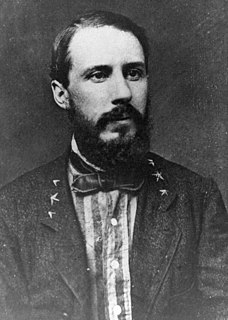
Edward Porter Alexander was an American military engineer, railroad executive, planter, and author. He served first as an officer in the United States Army and later, during the American Civil War (1861–1865), in the Confederate Army, rising to the rank of brigadier general.
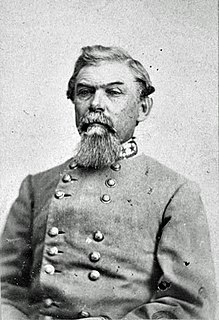
William Joseph Hardee was a career U.S. Army and Confederate States Army officer. For the U.S. Army, he served in the Second Seminole War and in the Mexican–American War, where he was captured and exchanged. In the American Civil War, he sided with the South and became a general. Hardee served in the Western Theater and quarreled sharply with two of his commanding officers, Braxton Bragg and John Bell Hood. He served in the Atlanta Campaign of 1864 and the Carolinas Campaign of 1865, where he surrendered with General Joseph E. Johnston to William Tecumseh Sherman in April. Hardee's writings about military tactics were widely used on both sides in the conflict.
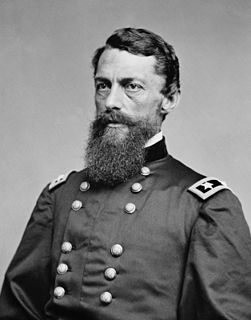
George Stoneman Jr. was a United States Army cavalry officer and politician who served as the fifteenth Governor of California from 1883 to 1887. He was trained at West Point, where his roommate was Stonewall Jackson, and graduated in 1846. Stoneman served in the Army for thirty-six years, though he was relieved of command in 1871. During this time, he was involved in multiple conflicts, including the Mexican–American War, where he did not see any combat, the Yuma War, and the American Civil War. In 1861, Stoneman was promoted to Brigadier General, and was later put in command of the Army of the Potomac's 3rd Infantry Corps, and subsequently the newly-created cavalry corps.

Henry Rootes Jackson was a major general in the Confederate States Army during the American Civil War.

The campaign of the Carolinas, also known as the Carolinas campaign, was the final campaign conducted by the United States Army against the Confederate States Army in the Western Theater. On January 1, Union Maj. Gen. William T. Sherman advanced north from Savannah, Georgia, through the Carolinas, with the intention of linking up with Union forces in Virginia. The defeat of Confederate Gen. Joseph E. Johnston's army at the Battle of Bentonville, and its unconditional surrender to Union forces on April 26, 1865, effectively ended the American Civil War.

The Western Theater of the American Civil War encompassed major military operations in the states of Alabama, Georgia, Florida, Mississippi, North Carolina, Kentucky, South Carolina and Tennessee, as well as Louisiana east of the Mississippi River. Operations on the coasts of these states, except for Mobile Bay, are considered part of the Lower Seaboard Theater. Most other operations east of the Appalachian Mountains are part of the Eastern Theater. Operations west of the Mississippi River took place in the Trans-Mississippi Theater.

Gilbert Moxley Sorrel was a staff officer and Brigadier General in the Provisional Army of the Confederate States.

Pierce Manning Butler Young was a major general in the Confederate States Army during the American Civil War and a post-war politician, diplomat, and four-term United States Congressman from Georgia.

Laurence Simmons Baker was an officer in the United States Army on the frontier, then later a brigadier general in the Confederate States Army during the American Civil War. His first name was spelled Lawrence in the records of the Confederate War Department and the mistaken spelling has persisted.
Cobb's Legion was an American Civil War unit that was raised on the Confederate side from the State of Georgia by Thomas Reade Rootes Cobb during the summer of 1861. A "legion" consisted of a single integrated command, with individual components from the infantry, cavalry, and artillery. When it was originally raised, the Georgia Legion comprised seven infantry companies, four cavalry troops, and a single battery. The concept of a multiple-branch unit was fine in theory, but never was a practical application for Civil War armies and, early in the war, the individual elements were assigned to other organizations.

Robert Houstoun Anderson was a West Point graduate, an infantry officer in the United States Army and later served as a Brigadier General in the Confederate States Army during the American Civil War, After the war he served as the Chief of the Police for the city of Savannah for 23 years and was twice appointed to serve on the Visitor's Board of the United States Military Academy at West Point, New York, NY. He played an important role with reunification efforts after the war.
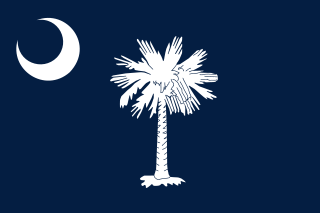
Hampton's Legion was an American Civil War military unit of the Confederate States of America, organized and partially financed by wealthy South Carolina planter Wade Hampton III. Initially composed of infantry, cavalry, and artillery battalions, elements of Hampton's Legion participated in virtually every major campaign in the Eastern Theater, from the first to the last battle.

Edward Lloyd Thomas was a Confederate brigadier general of infantry during the American Civil War from the state of Georgia. He was colonel of the 35th Georgia Infantry Regiment, which was assigned to Joseph R. Anderson's brigade, which became part of A.P. Hill's famed "Light Division." When Anderson left to take control of the Tredegar Iron Works in Richmond, Thomas was promoted to brigadier general to command the brigade. He retained this position for the rest of the war and was present at all of the major battles of the Army of Northern Virginia
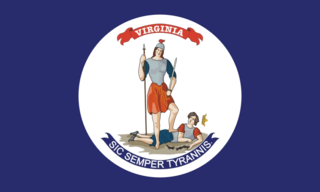
The 6th Virginia Cavalry Regiment was a cavalry regiment raised in Virginia for service in the Confederate States Army during the American Civil War. It fought mostly with the Army of Northern Virginia.
This is a list of battles and skirmishes of the American Civil War during the year 1865, the final year of the war. During the year, Union forces were able to capture the last major Confederate ports still open to shipping, along with the Confederate capital, and forced the surrender of the four major Confederate commands.
The Jeff. Davis Legion was a cavalry regiment of the Confederate States Army. Made up of companies from Mississippi, Alabama, and Georgia; it fought primarily in the Eastern Theater of the American Civil War. In 1865, it was reassigned to the Army of Tennessee, surrendering at Greensboro, N.C.
The Bog Wallow Ambush was a small unit action during the American Civil War that took place between Confederate forces under Captain J. Fred. Waring and Union forces under Colonel George W. Taylor on December 4, 1861, in Fairfax County, Virginia, as part of Maj. Gen. George B. McClellan's operations in northern Virginia. The Union force set up an ambush for the Confederate force on the Braddock Road. The action resulted in a Union victory.
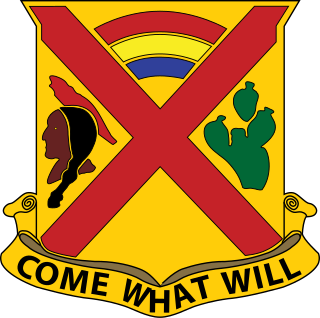
The Georgia Hussars are a cavalry unit founded before the American Revolution that continues today as part of the Georgia National Guard. The Hussars served the State of Georgia as part of the Confederate States Army during the American Civil War, and after reconciliation served in Mexico, World War I, World War II, Korea, Vietnam, Desert Storm, Bosnia and Herzegovina, and The War on Terror.

Joseph Frederick Waring was an American scholar, preservationist and author. A Yale University graduate, he went on to teach at several schools, including over thirty years at the Western Reserve Academy. He also wrote three books.
















